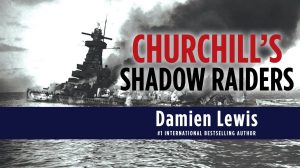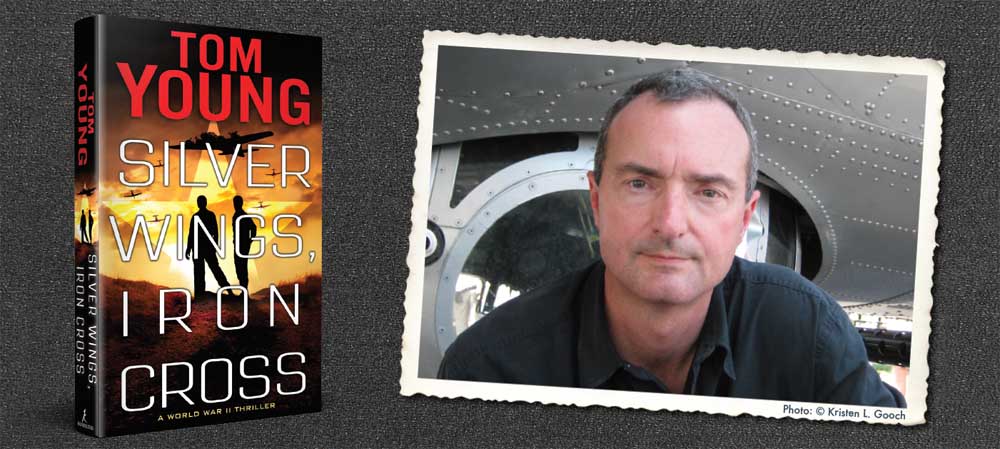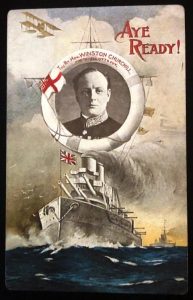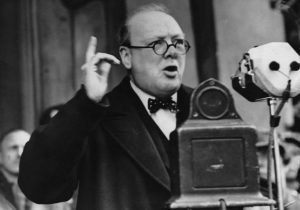
Bulletin #143 – May 2020
Churchill’s Writings: Essential Background for a WWII Novel

April 24, 2020
Tom Young, Author of Silver Wings, Iron Cross
As I began to research my new World War II novel, Silver Wings, Iron Cross, I considered Winston Churchill essential reading. The six volumes of The Second World War provided invaluable context, with an almost day-to-day overview of events. Naturally, I looked especially for anything that informed the plot of my novel. Within its pages, a downed American pilot and a deserting German submariner try to survive together as the Third Reich collapses around them. From the perspectives of the two main characters, the story involved the air war over Europe and the U-boat effort to choke off supplies to Britain.
In Volume 2, Their Finest Hour, Churchill says, “The only thing that ever really frightened me during the war was the U-boat peril.” His observation emphasized for me the centrality of the Battle of the Atlantic. Here on the American side of the ocean, we Yanks—with our enormous mid-continent breadbasket—might forget how heavily an island nation depends on a merchant fleet. Churchill’s accounting reminds writers and historians that, for a time, the fate of the world hinged on a maritime lifeline between North America and Great Britain.

2025 International Churchill Conference
In Volume 5, Closing the Ring, Churchill describes how the efforts of the British Bomber Command and the U.S. Eighth Air Force complemented each other. He cites a particular set of missions on February 24, 1944. On that date, the Eighth Air Force sent 266 bombers to attack the ball-bearing plants at Schweinfurt by daylight precision bombing. Bomber Command followed up that very night, sending 734 aircraft against the same set of targets. As Churchill puts it, “Here was really a combined offensive directed towards the common aim.”
By this means, Churchill writes, the Allies taxed the capabilities of the German fighter aircraft fleet, and managed to achieve daylight air superiority in 1944.
I tried to reflect this in the novel. My American bomber pilot gets shot down during a daylight raid on a submarine base at Bremen. That evening, as he shelters in an abandoned warehouse, he witnesses the fury of a night raid by Lancaster and Halifax bombers.
Later, through a clandestine radio, some of the characters follow news of the war. Again, the volumes of The Second World War proved relevant. I referenced the Yalta conference of February, 1945, when Churchill met with President Franklin Roosevelt and Soviet Premier Joseph Stalin. Churchill describes the conference in Volume 6, Triumph and Tragedy.
The prime minister said famously that he proposed to write the history of the war. Then he rolled up his sleeves and went to work. His rendering of that history has become a source document for the ages. As great a historian as he was a statesman, he received the Nobel Prize in Literature in 1953. There’s a popular and mistaken belief that he received the prize for The Second World War alone. Actually, the Nobel citation reads: “for his mastery of historical and biographical description as well as for brilliant oratory in defending exalted human values.”
The American broadcast journalist Edward R. Murrow expressed a similar idea: “He mobilized the English language and sent it into battle.” We’ve all heard the old saying about how the pen is mightier than the sword. But for Churchill, the pen was his sword, and with it he emboldened his countrymen to endure hardships we can hardly imagine today.
As a lifelong writer, I admire how Churchill’s works reflect both precision and passion. In writing novels set during World War II, I aspire to the same sort of precision, while telling a story that also portrays the passions of those times. Churchill’s work will inform and inspire as long as the English language is spoken.
Purchase your copy of Silver Wings from one of your favourite booksellers.
IndieBound
Amazon
Barnes & Noble
Target
Hudson Booksellers
Kobo
Books-a-Million
Google Books
Amazon U.K.
Tom Young is the highly acclaimed author of military thrillers and historical fiction, including Silver Wings, Iron Cross. His nonfiction works include The Speed of Heat and his narrative, “Night Flight to Baghdad,” appeared in the anthology Operation Homecoming. Young served in Afghanistan and Iraq with the Air National Guard and logged nearly 5,000 hours flying missions in Bosnia, Kosovo, Latin America, the horn of Africa, and the Far East. His military honors include three Air Medals, three Aerial Achievement Medals, and the Air Force Combat Action Medal. He retired from the military as a Senior Master Sergeant. In civilian life, Young spent ten years as a writer and editor with the broadcast division of the Associated Press, and he works as an airline pilot based at Reagan National Airport near Washington, D.C. He is a member of The National Press Club, The Authors Guild and International Thriller Writers, and is a vice commander of American Legion Post 20. More information about Tom Young and his work can be found online at TomYoungBooks.com.
This story has been sponsored by Kensington Publishing Corp., New York, NY.
Subscribe
WANT MORE?
Get the Churchill Bulletin delivered to your inbox once a month.





